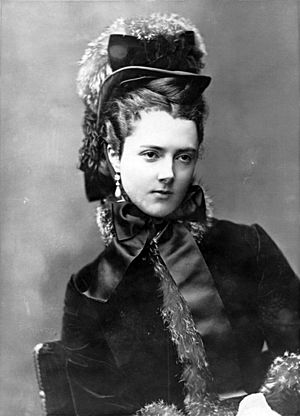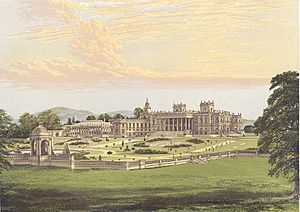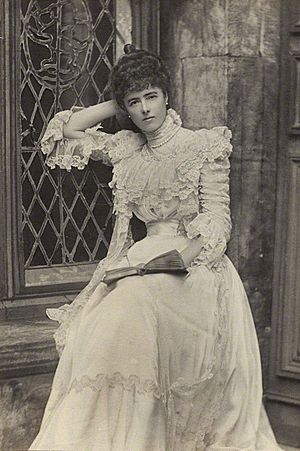Georgina Ward, Countess of Dudley facts for kids
Quick facts for kids
The Countess of Dudley
|
|
|---|---|

The Countess of Dudley in the 1880s
|
|
| Personal details | |
| Born |
Georgina Elizabeth Moncreiffe
9 August 1846 Dunbarney, Perthshire, Scotland |
| Died | 2 February 1929 (aged 82) Pembroke Lodge, Richmond Park, London |
| Spouse |
William Ward, 1st Earl of Dudley
(m. 1865; died 1885) |
| Children | 7, including William Ward, 2nd Earl of Dudley John Hubert Ward |
| Awards | Royal Red Cross Dame of the Order of Saint John |
Georgina Elizabeth Ward, Countess of Dudley (born August 9, 1846 – died February 2, 1929) was an important British noblewoman. She was known for her beauty during the Victorian era. She also dedicated much of her life to helping others, especially during wartime.
Contents
Early Life and Family Background
Georgina Elizabeth Moncreiffe was born in Dunbarney, Perthshire, Scotland. She was one of several sisters who were all known for being very beautiful. Her father was Sir Thomas Moncreiffe, 7th Baronet, and her mother was Lady Louisa Hay-Drummond. Her family was well-known in Scottish society.
Marriage to the Earl of Dudley
In 1865, when Georgina was 18, she became engaged to William Ward, 1st Earl of Dudley. He was 48 years old and a very rich man. He owned a lot of land and mines. The Earl had been a widower since 1851, as his first wife had passed away.
Georgina and the Earl married on November 21, 1865, in London. The Earl was very proud of his new wife's beauty. He loved to show her off during their travels across Europe. People everywhere were amazed by her looks. Even famous figures like Empress Eugénie of France and the Empress of Austria were said to be outshone by Georgina.
Her beauty was truly special. Many women were beautiful, but her perfectly shaped head, lovely skin, and stunning eyes made her famous across Europe. Even Empress Eugénie and her court in Compiègne admitted they were completely outshone. In Vienna, crowds watched the Imperial carriage and agreed that their own Empress seemed less bright next to the Englishwoman.
—Obituary of Lady Dudley in The Times, 4 February 1929
During their marriage, Georgina and the Earl had seven children: one daughter and six sons. The Earl gave his wife many expensive gifts, including beautiful clothes and jewels. However, he did not let her manage their grand homes, like Witley Court and Dudley House, London.
For 14 years, this queen of beauty lived in a luxurious but controlled life. Lord Dudley was cultured and generous, but also very bossy. He insisted his wife wear fancy dresses even in remote places. He gave her amazing jewels, some of which were stolen in a famous robbery. He bought her famous vases as a birthday gift. He gave her everything – except any real responsibility.
—Obituary of Lady Dudley in The Times, 4 February 1929

The Jewel Robbery
A famous crime in Victorian England happened on December 12, 1874. Lady Dudley's jewels were stolen at Paddington Station. These jewels were worth a lot of money, about £25,000 at the time. They were never found.
Taking Charge of the Estates
In 1879, the Earl of Dudley became very ill after a stroke. Georgina immediately took control of managing their family estates and looking after her husband's health. She nursed him faithfully and stayed by his side. She rarely attended social events without him. The Earl passed away on May 7, 1885.
Life After the Earl's Death
After her husband died, Lady Dudley became more active in social life again. She never remarried, even though many important people wanted to marry her. She focused on her family, especially her sons' education. She also dedicated herself to national service and charity work.
In 1908, she became a Lady President of the League of Mercy. This group helped find volunteers to care for sick and suffering people in charity hospitals.
Wartime Service
Lady Dudley played a big role during the Second Boer War and World War I. She worked with the British Red Cross Society. In late 1900, she helped run a nursing home in Mayfair for officers who were injured in the Boer War. Her efforts helped Captain Trenchard (who later became a very important leader in the Royal Air Force) recover from a war wound.
During World War I (1914-1918), she worked nine hours a day at a hospital for recovering soldiers. She cared for many injured people. Sadly, she lost her youngest son in the early days of this war.
Lady Dudley was a close friend of Queen Alexandra. As a dowager countess (a widow of an earl), she lived at Pembroke Lodge, Richmond Park in London. This home was given to her by King Edward as a special gift.
She died at Pembroke Lodge in February 1929 at the age of 82. She had been a widow for more than half of her life.
Children of Georgina and the Earl
Georgina and the Earl had six sons and one daughter. Two of their sons died young. Their fourth son, Captain Reginald Ward, passed away in 1904 after an operation. Their youngest son, Lieutenant Gerald Ward, was a talented cricketer. He was killed in action in 1914 during World War I in Belgium.
- William Humble Ward, 2nd Earl of Dudley (1867–1932)
- Hon. Sir John Hubert Ward (1870–1938)
- Hon. Robert Arthur Ward (1871–1942)
- Lady Edith Amelia Ward (1872–1956), who married Frederick Glyn, 4th Baron Wolverton
- Captain Hon. Reginald Ward (1874–1904)
- Captain Hon. Cyril Augustus Ward (1876–1930)
- Lieutenant Hon. Gerald Ernest Francis Ward (1877–1914)
Awards and Recognition
The Countess of Dudley received several important awards for her service:
- In 1901, she was made a Dame of Grace of the Order of Saint John. She was promoted to Dame of Justice of that order in 1928.
- In 1902, she was awarded the Royal Red Cross. This award recognizes exceptional nursing in the British armed forces.
Images for kids
-
The Dudley family estate at Witley Court in 1880.
 | William L. Dawson |
 | W. E. B. Du Bois |
 | Harry Belafonte |





